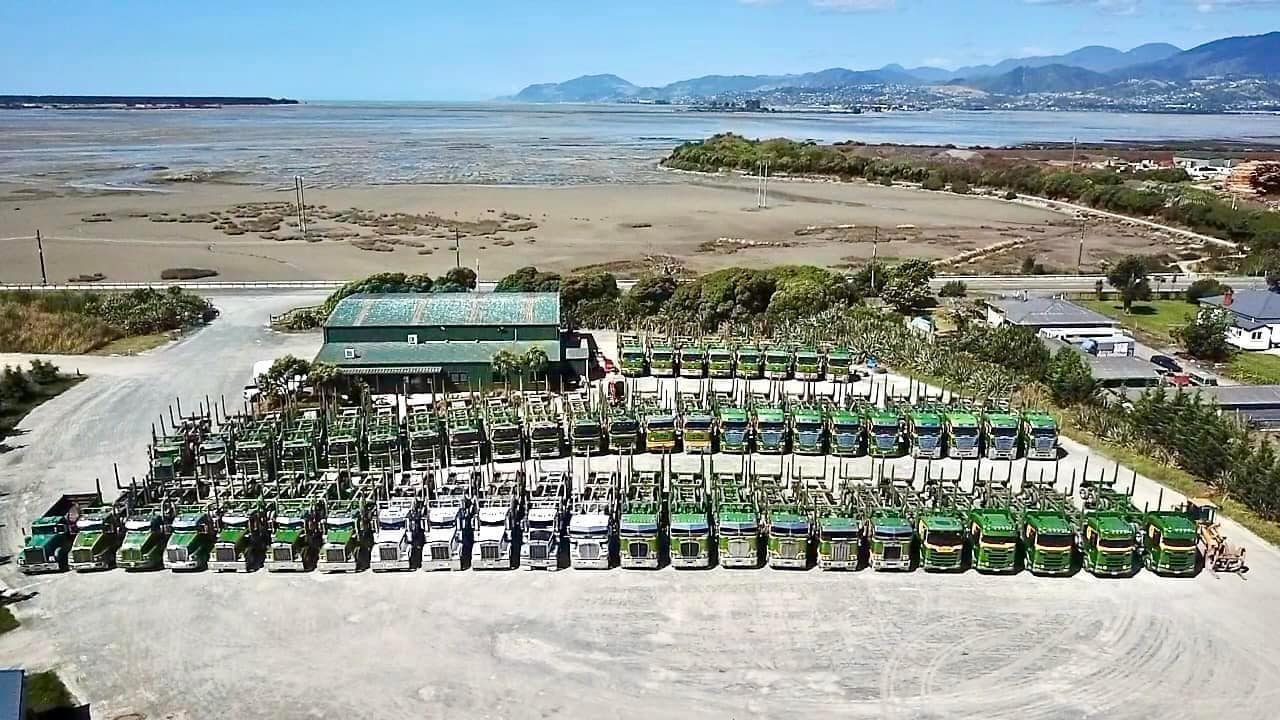Job losses as forestry hit hard


Stuart Drummond Transport drivers are only working four days a week as the forestry industry goes through a major downturn. Photo: Stuart Drummond Transport.
Some forestry contractors are “up against the wall” as the industry goes through a major downturn, forcing layoffs and sending skilled workers overseas.
The downturn is the result of China’s economic woes creating less demand for logs for its construction industry.
At the same time, costs have sky-rocketed in the past few years and with reduced revenue, forest owners are reducing their harvest operations.
PF Olsen Nelson branch manager Sam Nuske says many small-scale harvest contractors have stopped work completely and larger-scale contractors have slowed down, meaning many have been forced to reduce hours for employees or lay them off.
“Many contractors are up against the wall. The question is how much equity they have and whether workers can find alternative jobs.
“The worry is the loss of talent going to Australia, and when work cranks up again we will be operating from a smaller pool of workers,” Sam says.
He says that has led to some contractors creating initiatives to keep employees in work, such as turning scrap wood into firewood, joining planting crews or pruning.
Sam says lending institutions are working with contractors to help them through the downturn and a look on TradeMe shows the financial hit on businesses.
“TradeMe sales for logging machinery is massive, but there are no buyers.”
However, he says people working in forestry tend to be resilient and passionate about their industry which will help many of them through the downturn.
Kim Bryant from Bryant Logging says the family business has been through ups and downs over the years, but this downturn coincides with huge increases in costs. In the past couple of years, wages, fuel and finance have eroded margins and the cost of new machinery has increased by 20 per cent.
He says it is “pretty bad” out there, with some crews not working at all or working less hours. Even mills have cut back production and the downturn is affecting those businesses servicing the forestry industry.
“They’re struggling as well and have let people go. Some people have gone to Australia, some are working in the mines or have gone to vineyards in Marlborough.
“In a nutshell, it’s all up in the air; God knows what is going on or when it’s going to come right. No-one really knows.”
The downturn is affecting every part of the forestry chain, including local sawmills and transport companies.
Stuart Drummond Transport managing director Brodie Drummond says business is down 30 to 40 per cent and drivers are only working four days a week.
“It’s impacting our business and impacting our staff, which is tough on everybody,” he says. “With the cost of living, you need to work more, not less. It’s definitely challenging times.”
The business ordered new trucks during the delays caused by Covid-19 and he says they are arriving now at a time the business and industry are going through financial hardship.
Forest Owners Association communication manager Don Carson says the Nelson-Marlborough area is highly reliant on forestry for its local economy – second only behind Gisborne.
About 10 per cent, or 170,000ha, of the country’s forest estate is grown in the Nelson-Marlborough area and he says the downturn in the industry will therefore have a big effect across the Top of the South.
“We have every sympathy and support where we can for the workforce,” Don says.
“Without that workforce, we wouldn’t have an industry, so acknowledge the difficulties many of them are having at the moment.”
Don says the downturn is part of ongoing fluctuations experienced by the industry due to market demand.
Other complicating issues for the industry are the Emissions Trading Scheme (ETS) review and the uncertainty of if and how forestry can be used for carbon credits.
“Not only do we not know what the price of carbon credits will be in another year, we have no idea whether there will even be carbon credits in another year.”
On the plus side, he says there is the Government’s promise of the Forestry and Wood Processing Industry Transformation Plan (ITP), which looks at the potential of building partnerships with the industry to build more processing facilities in New Zealand and sell higher-value export products.
